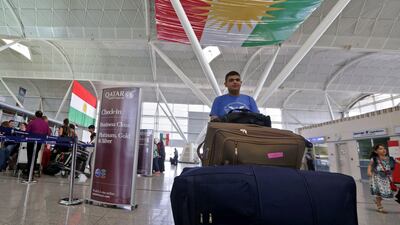The chief obstacle in the Kurdish quest for self-rule has always been the dispersed reality of the aspirants to sovereignty. The creation of a “Greater Kurdistan” has been contingent on concessions from the four states where Kurds are concentrated: Turkey, Syria, Iran and Iraq. Creating consensus in one country in the most ideal of conditions can be hard enough. Now imagine the difficulty of effecting a compromise that requires four separate nations to make territorial sacrifices in a region as volatile as contemporary Middle East, and you get a sense of the patience and prudence required to bring a viable Kurdish state into being.
Masoud Barzani showed neither virtue in his rush to stage an independence plebiscite in Kurdistan Region, the only autonomous area of Iraq. The president of the region railroaded the referendum in defiance of regional and international opinion and trampled, in the process, on common sense. Iraqi Kurdistan is the only place on earth where the Kurds have managed to build a proto-state. The Kurdish yearning for self-rule found a substantial degree of expression there. The survival of this autonomy in post-Baathist Iraq depended on mutual respect. In an exclusive interview with The National, Iraqi vice-president Ayad Allawi accused Nouri Al Maliki, Iraq's pro-Iranian former premier, of alienating the Kurds with his "partisan and sectarian" approach to governance.
_______________
Read more
Iraqi Kurdistan's independence referendum will harm the people it claims to benefit
92% of Kurdish voters choose independence from Iraq
Exclusive: Iraq paying price today for past mistakes says vice-president
_______________
But the referendum is scarcely a solution to the grievances of the Kurds, as Mr Barzani must surely know. Iraq shed vast quantities of blood to liberate a third of the country from the grip of ISIL. The idea that Baghdad will now surrender to demands to forfeit the exact amount of land to the Kurds, effectively self-balkanising just having secured Iraq's territorial integrity at tremendous cost, is preposterous. The fact that 92 per cent of the participants in the referendum voted for secession does not automatically sanctify Kurdish claims to areas that have sizeable non-Kurdish minorities. The Iraqi state, still legally the sovereign over all of the country, owes the duty of protection to all its citizens.
Mr Barzani, far from emancipating the Kurds, has provoked fresh conflict in a country that desperately needs a long stretch of stability and peace. Just when Iraq was poised to regain its composure, Mr Barzani has generated a wholly unnecessary crisis. He has not helped the cause of Iraqi Kurds, whose autonomy is now exposed to uncertainty. Nor has he done any favours to fellow Kurds in the region, whose governments, anxious to contain similar spectacles in their own countries, may unleash severely stifling measures.
The Iraqi government is understandably furious. But military action will widen the schism between the Kurdistan Region and the rest of the country. A shooting war is the last thing the people of Iraq deserve. Mr Barzani has failed his people; the Iraqi government must not. Dialogue may not resolve every difference. But it is the only thing that can avert bloodshed.
Follow The National's Opinion section on Twitter
____________________________
More from Opinion on the Kurdish referendum
The Kurdish referendum is a distraction from the real issues at stake
Iraqi Kurdistan's independence referendum will harm the people it claims to benefit
The genie of Kurdish independence will be hard to put back in the bottle
____________________________

